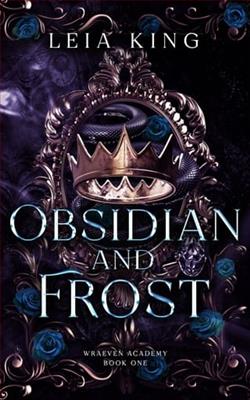Page 79 of Twisted Addiction
The world blurred through tears and shock.
Today had already been a nightmare—Penelope’s betrayal, the guards’ beating—and now this? It couldn’t get worse. It couldn’t.
She’d found me. She’d finally found me after all those years — and now she was gone.
Taken.
I forced myself upright, my entire body shaking, and limped out of the room, stumbling down the corridor.
The elevator was too slow, so I half-fell down the stairs, gripping the railing to keep myself upright, the metal slick with my own blood.
The lobby lights burned too bright when I burst through the doors. The night clerk — a middle-aged woman with weary eyes — jerked upright behind the counter, startled.
“My mother,” I gasped, slamming my palms on the desk, leaving bloody prints on the wood. “Someone broke into our room — she’s gone! You have cameras, you must’ve seen—”
Her expression changed. Not fear, not confusion — composure. Practiced. Controlled. She looked at me the way a doctor looks at a dying patient — pitying, detached.
“The Romanos left a message,” she said, her voice flat, each word falling like a stone. “They said you trespassed on their property tonight. You’re alive because of who your foster family is — because of the men in Lake Como who would’ve avenged your death.”
My pulse froze. “What are you saying?”
Her gaze flickered — not cruel, but resolute, as though she wished she could lie but couldn’t.
“They couldn’t kill you,” she said quietly, “so they took your mother instead.”
The world stopped. My breath came in shallow bursts.
My heart pounded so hard it felt like it would crack my ribs open.
I leaned forward, voice shaking with rage and disbelief. “Who ordered it?”
For a moment, she hesitated — then she spoke the name that ended whatever innocence I had left.
“Penelope Romano.”
The room tilted.
My pulse stuttered. “No... no, that’s—” I choked on the rest, shaking my head like I could undo the sound of it. “You’re lying.”
My vision swam, the room spinning in a blur of blood, neon, and disbelief.. “She couldn’t—she wouldn’t—”
But the image came unbidden. Her in another man’s arms, skin against skin, the warmth of her body pressed to someone who wasn’t me. My stomach turned. My knees nearly gave out.
“She’s just fifteen,” I rasped, half to myself, half to the world that had stopped making sense. “She can’t be that cruel... she can’t.”
The clerk didn’t flinch.
Her eyes were flat, her tone stripped of mercy. “Cruelty doesn’t wait for age. Especially not in their world.”
The clerk’s tone was flat, practiced, like she’d rehearsed this conversation before. “She only dated you to plant a tracker,” she said. “A bug, in your jacket, your backpack—somewhere close enough to trace you when you went back to Italy. The Romanos wanted to map your foster family’s operations.”
“You were leverage, Dmitri. That’s all.”
I blinked, my heart hammering. “No... she’s fifteen,” I said, shaking my head, as though saying it aloud could make it true. “She doesn’t even know what a bug is. She—she reads poetry. She cries when pigeons die. She—”
“She’s a Romano,” the woman cut in sharply. “In that world, innocence dies before childhood does. They use their children the way normal families use prayers.”
I stared at her, searching for any flicker of doubt, any sign she was bluffing. But she only reached into a drawer and slid a scrap of paper toward me, her fingers steady, her expression grim.















